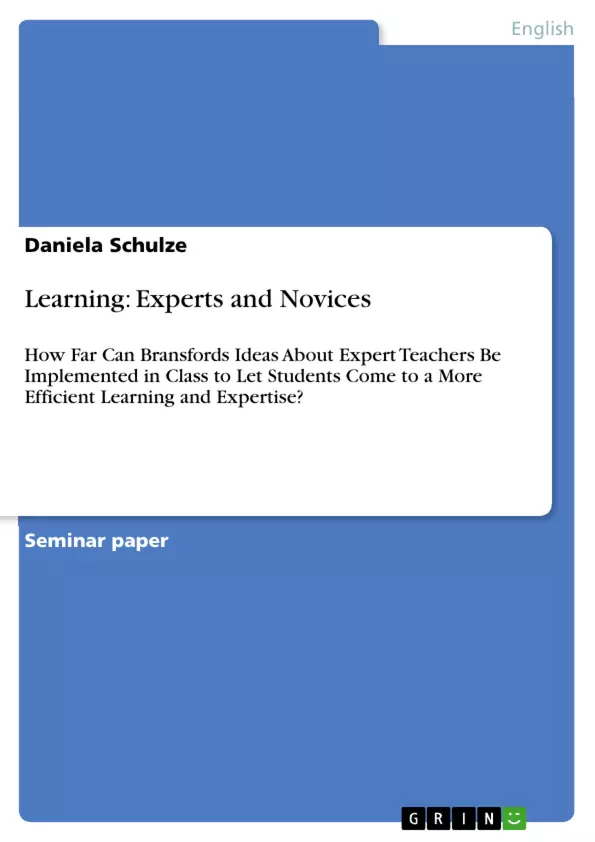How can teachers generate particular classroom settings to motivate students to most effective learning? How can they use diverse methods to bring students to deep understanding of a discipline? The report “How People Learn – Brain, Mind, Experience and School” (1999) by John D. Bransford et al. is the basic foundation for my paper, because the authors seek for answers to these questions.
I will first make a distinction between experts and novices to come to know to what extent effectiveness is possible and how the most effective mastery can be achieved. I will analyze expertise within the teaching profession and find out, how teachers are supported. Moreover it helps to deduce practicality in class from scientific assumptions. It also shows that a special teacher training is indispensable. Ongoing it is necessary to have a look at the teacher’s sensitivity concerning his students and his self-reflection towards his lessons. An analysis of the characteristics of the subject matter will facilitate a well-conceived choice of topics. I will have a look at difficulties with the design of tasks and problems with the concept of expert teachers.
Inhaltsverzeichnis (Table of Contents)
- How Far Can Bransfords Ideas About Expert Teachers Be Implemented in Class to Let Students Come to a More Efficient Learning and Expertise?
- Experts and Novices
- Experts and Novices in the Teaching Profession
- The Teacher's Sensitivity and Self-Reflection
- The Subject Matter: An Analysis
- Difficulties with the Design of Tasks and Problems with the Concept of Expert Teachers
Zielsetzung und Themenschwerpunkte (Objectives and Key Themes)
The paper aims to explore the applicability of John D. Bransford’s ideas about expert teachers in a classroom setting, focusing on enhancing student learning and development of expertise. The paper examines the key principles of expertise and novice-hood as outlined by Bransford and applies them to the teaching profession.
- The characteristics of experts and novices
- The role of expert teachers in fostering student learning and expertise
- The importance of teacher training and ongoing professional development
- The impact of subject matter and task design on student learning
- The challenges of implementing effective teaching practices
Zusammenfassung der Kapitel (Chapter Summaries)
- This section begins by introducing the concept of expert teachers and defining their characteristics, highlighting the importance of deep understanding and well-organized knowledge. The author then contrasts expert teachers with novice teachers, outlining their differences in terms of knowledge acquisition, problem-solving strategies, and overall learning effectiveness.
- The paper examines the implications of the expert-novice model for the teaching profession. It emphasizes the need for high-quality teacher training, ongoing self-reflection, and mentorship to support teachers in their development. The importance of teachers recognizing their own limitations and fostering a lifelong learning attitude among students is also stressed.
- The author delves into the significance of pedagogical content knowledge and the teacher's role in tailoring instruction to individual student needs. The importance of conceptual understanding over rote memorization and the need for alternative assessment methods that measure deeper learning are explored.
- The paper emphasizes the importance of reflective teaching practices, highlighting the need for teachers to constantly analyze and improve their teaching methods. The importance of building strong rapport with students and creating an environment conducive to interaction and open communication is also discussed.
- This section explores the role of subject matter selection and task design in supporting student learning. The author stresses the need for carefully chosen topics that promote conceptual understanding and deep knowledge acquisition. The importance of aligning tasks with learning objectives and using assessment tools that measure deeper learning are also discussed.
Schlüsselwörter (Keywords)
This paper examines expert teachers, novice teachers, learning styles, teaching strategies, pedagogical content knowledge, conceptual understanding, deep learning, assessment methods, reflective teaching, and task design.
Frequently Asked Questions
What is the difference between an expert and a novice in learning?
Experts have a deep, well-organized knowledge base and effective problem-solving strategies, whereas novices often have fragmented knowledge and rely on surface-level understanding.
What are the key ideas of John D. Bransford regarding learning?
Bransford emphasizes understanding how people learn through brain research, experience, and school settings, focusing on how teachers can motivate students for deep understanding.
Why is teacher self-reflection important for student expertise?
Self-reflection allows teachers to analyze and improve their methods, building better rapport with students and creating interaction-conducive environments.
What is pedagogical content knowledge?
It is the teacher's ability to tailor specific subject matter instruction to the individual needs of students to foster conceptual understanding.
How does task design affect learning?
Carefully designed tasks promote conceptual understanding and align with learning objectives, helping students move from rote memorization to deep knowledge acquisition.
- Arbeit zitieren
- Daniela Schulze (Autor:in), 2009, Learning: Experts and Novices, München, GRIN Verlag, https://www.grin.com/document/139170



